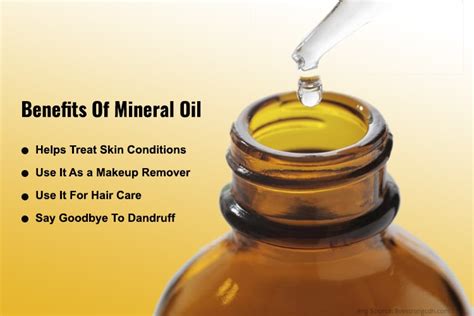Introduction
Mineral oil, a colorless, odorless liquid derived from petroleum, has long been used in various cosmetic and industrial applications due to its emollient and occlusive properties. While it has been recently stigmatized due to potential health concerns, mineral oil remains a widely used ingredient in hair care products. This article delves into the myriad uses of mineral oil for hair, its pros and cons, and potential alternatives.

Benefits of Mineral Oil for Hair
1. Moisturizes and Softens
Mineral oil creates a barrier on the hair shaft, preventing moisture loss, increasing flexibility, and reducing breakage. It is particularly beneficial for dry, damaged, or chemically treated hair.
2. Adds Shine
Mineral oil’s occlusive properties give hair a glossy, healthy appearance by reflecting light. It can enhance the overall luster of dull or lackluster locks.
3. Protects from Heat Damage
Mineral oil’s protective film shields the hair from thermal damage caused by styling tools, such as blow dryers and straighteners. It can help prevent split ends and breakage.
4. Detangles
The emollient properties of mineral oil make hair smoother and less prone to tangles, facilitating easy brushing and styling.
Concerns Regarding Mineral Oil
Despite its benefits, mineral oil has raised some concerns:
1. Potential for Clogging
Mineral oil can clog hair follicles and weigh hair down, leading to scalp irritation and potential hair loss. This is particularly concerning for individuals with fine or oily hair.
2. Build-up
Mineral oil can accumulate on the hair shaft over time, making it susceptible to dirt and debris, resulting in a dull, greasy appearance.
3. Limited Absorption
Mineral oil sits on the hair surface and does not penetrate the shaft like natural oils, limiting its ability to nourish and repair hair.
Alternatives to Mineral Oil
If mineral oil concerns you, consider these alternatives:
1. Natural Oils
Coconut oil, argan oil, and avocado oil are rich in essential fatty acids and antioxidants, providing deep nourishment and hydration without clogging hair follicles.
2. Silicones
Silicones are synthetic polymers that mimic the effects of mineral oil, creating a smooth, shiny layer on the hair without the potential for build-up. However, they may not provide the same level of protection as mineral oil.
3. Emulsified Oils
Emulsified oils are water-based formulas that combine the benefits of natural oils and silicones, offering lightweight hydration without greasiness.
Applications of Mineral Oil for Hair
Mineral oil finds applications in various hair products, including:
1. Hair Oils
Mineral oil is a common ingredient in hair oils designed to moisturize, soften, and protect hair.
2. Hair Conditioners
Conditioners containing mineral oil help detangle and smooth hair, improving combability.
3. Styling Products
Mineral oil is often used in styling products, such as hair sprays and gels, to provide hold and shine to hairstyles.
4. Scalp Treatments
Mineral oil can be used as a scalp treatment to soothe dryness and irritation. It helps remove flakes and restore scalp health.
Conclusion
Mineral oil remains a widely used ingredient in hair care products due to its emollient and occlusive properties. While it can provide significant benefits for dry, damaged, or chemically treated hair, concerns regarding potential clogging and build-up have led to the exploration of alternatives. Understanding the pros and cons of mineral oil and considering alternatives allows for informed choices regarding hair care practices.
Useful Tables:
Table 1: Comparison of Mineral Oil and Alternatives
| Feature | Mineral Oil | Natural Oils | Silicones | Emulsified Oils |
|---|---|---|---|---|
| Moisturizing | High | High | Moderate | Moderate |
| Occlusivity | High | Low | High | Moderate |
| Absorption | Low | High | Low | Moderate |
| Potential for build-up | High | Low | Moderate | Low |
Table 2: Mineral Oil in Hair Products
| Product Type | Purpose | Benefits |
|---|---|---|
| Hair Oils | Moisturizing, softening, protecting | Prevention of dryness, breakage, and heat damage |
| Hair Conditioners | Detangling, smoothing | Improved combability, reduced tangles |
| Styling Products | Hold, shine | Sculptured hairstyles with glossy finish |
| Scalp Treatments | Soothing, hydrating | Relief from dryness, irritation, and flakes |
Table 3: Pros and Cons of Mineral Oil for Hair
| Pros | Cons |
|---|---|
| Moisturizes and softens | Potential for clogging |
| Adds shine | Build-up on hair shaft |
| Protects from heat damage | Limited absorption |
| Detangles | Greasy appearance with excessive use |
Table 4: Alternatives to Mineral Oil
| Alternative | Benefits | Challenges |
|---|---|---|
| Natural Oils | Deep nourishment, rich in nutrients | Can be heavy on fine hair |
| Silicones | Smooth, shiny finish | May not provide same level of protection |
| Emulsified Oils | Lightweight hydration, clog-free | May not be as effective as pure oils |
